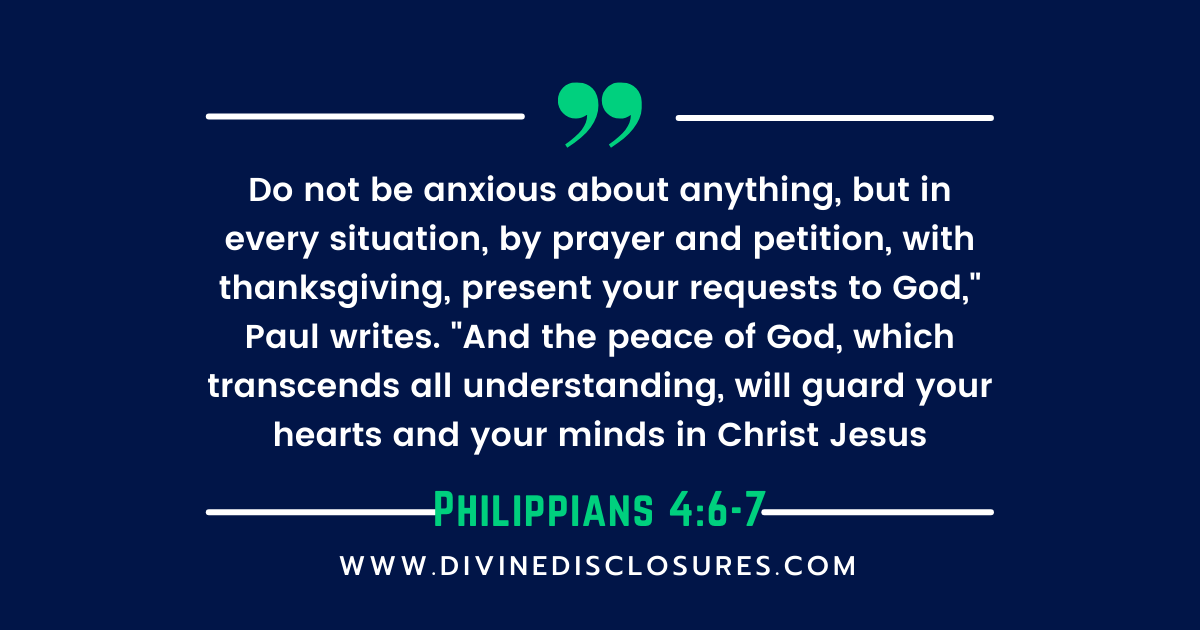Nestled between Paul’s exhortations to stand firm in the Lord and think on what is noble and right, we discover a profound promise for overcoming anxiety and embracing God’s peace.
“Do not be anxious about anything, but in every situation, by prayer and petition, with thanksgiving, present your requests to God,” Paul writes. “And the peace of God, which transcends all understanding, will guard your hearts and your minds in Christ Jesus” (Philippians 4:6-7).
At first read, these familiar verses can sound like a blithe reassurance that if we just pray instead of worrying, everything will feel peaceful. But when we consider the original context, we unearth the radical nature of Paul’s directive not to be anxious amidst circumstances that might provoke real fear. By God’s strength, through prayer with thanksgiving, we gain access to a flavor of profound peace that logic cannot grasp but that can profoundly shape our inward being.
As we open Philippians 4 6-7 through the inspiration of the Holy Spirit, we discover a bracing message of hope and a pathway for gaining resilience in the face of harsh realities. We proceed eager for insight from the Word of God and the power of the Spirit, through whom we can embrace the peace of God in ever-increasing measure.
Table of Contents
Philippians 4 6-7
Here are Philippians 4:6-7 with the translations along with their references:
Philippians 4:6-7 (KJV):
“Be careful for nothing; but in every thing by prayer and supplication with thanksgiving let your requests be made known unto God. And the peace of God, which passeth all understanding, shall keep your hearts and minds through Christ Jesus.”
Philippians 4:6-7 (ESV):
“Do not be anxious about anything, but in everything by prayer and supplication with thanksgiving let your requests be made known to God. And the peace of God, which surpasses all understanding, will guard your hearts and your minds in Christ Jesus.”
Philippians 4:6-7 (NIV):
“Do not be anxious about anything, but in every situation, by prayer and petition, with thanksgiving, present your requests to God. And the peace of God, which transcends all understanding, will guard your hearts and your minds in Christ Jesus.”
Philippians 4:6-7 (NKJV):
“Be anxious for nothing, but in everything by prayer and supplication, with thanksgiving, let your requests be made known to God; and the peace of God, which surpasses all understanding, will guard your hearts and minds through Christ Jesus.”
Philippians 4:6-7 (AMPLIFIED):
“Do not be anxious or worried about anything, but in everything [every circumstance and situation] by prayer and petition with thanksgiving, continue to make your [specific] requests known to God. And the peace of God [that peace which reassures the heart, that peace] which transcends all understanding, [that peace which] stands guard over your hearts and your minds in Christ Jesus [is yours].”
Philippians 4:6-7 (NLT):
“Don’t worry about anything; instead, pray about everything. Tell God what you need, and thank him for all he has done. Then you will experience God’s peace, which exceeds anything we can understand. His peace will guard your hearts and minds as you live in Christ Jesus.”
Philippians 4:6-7 (NASB):
“Be anxious for nothing, but in everything by prayer and pleading with thanksgiving let your requests be made known to God. And the peace of God, which surpasses all comprehension, will guard your hearts and your minds in Christ Jesus.”
Philippians 4:6-7 (MSG):
“Don’t fret or worry. Instead of worrying, pray. Let petitions and praises shape your worries into prayers, letting God know your concerns. Before you know it, a sense of God’s wholeness, everything coming together for good, will come and settle you down. It’s wonderful what happens when Christ displaces worry at the center of your life.”
These references provide clarity and context for each translation of Philippians 4:6-7.
Philippians 4:6-7 Meaning
What does Philippians 4:6-7 mean?
In Philippians 4:6-7, Paul instructs the believers not to be anxious about difficulties, but rather to bring their needs and requests to God through prayer.
The Greek present tense verbs imply an ongoing habit of prayerful petition and thanksgiving that serves to guard their hearts and minds.
This prayer posture is grounded in God’s peace and presence, as emphasized in verse 7. Here, Paul intriguingly uses a military term for a sentry guarding a city to portray how God’s peace protects the believer’s thoughts and emotions. This “peace of God” has an objective existence, but is subjectively experienced as believers commune with God.
Overall, these verses outline prayer as the antidote to anxiety, promising God’s personal presence and transcendent peace as believers turn to Him with grateful hearts.
The passage calls for an ongoing commitment to prayer that reorients thought patterns away from anxiousness and onto the guarding peace of Christ.
If you are interested in delving deeper, let’s wade into a deeper study of Phil 4 6-7.

Exegetical Analysis of Philippians 4:6-7
Philippians 4:6-7 states:
“Do not be anxious about anything, but in every situation, by prayer and petition, with thanksgiving, present your requests to God. And the peace of God, which transcends all understanding, will guard your hearts and your minds in Christ Jesus.”
This passage comes in the closing section of Paul’s letter, where he gives final exhortations to the church at Philippi.
Paul starts by commanding the Philippians, “Do not be anxious about anything” (μηδὲν μεριμνᾶτε). The verb “be anxious” (μεριμνᾶτε) is present imperative active, indicating an ongoing prohibition against anxiety, fear, and worry. As disciples of Christ, they are not to be perpetually anxious.
The contrasting conjunction “but” (ἀλλὰ) shifts to what they should be doing: “in every situation, by prayer and petition, with thanksgiving, present your requests to God” (ἐν παντὶ τῇ προσευχῇ καὶ τῇ δεήσει μετὰ εὐχαριστίας τὰ αἰτήματα ὑμῶν γνωριζέσθω πρὸς τὸν θεόν).
Rather than worry or fear, they are to go to God in prayer, making specific requests with gratitude. The verb “present” or “make known” (γνωριζέσθω) is a present passive imperative, showing an ongoing submission and disclosure of needs and thanksgiving to God.
The result is introduced with “and” (καὶ) – “the peace of God” (ἡ εἰρήνη τοῦ θεοῦ) will guard their inner beings. “Will guard” (φρουρήσει) is a future active indicative, indicating a promised protection of peace that transcends human understanding. This peace will guard both the “hearts” (καρδίας, the control center) and “minds” (νοήματα, perceptions, thoughts) in Christ Jesus (ἐν Χριστῷ Ἰησοῦ). Rather than anxiety, the believer who prays with gratitude will experience supernatural peace.
In summary, Paul challenges the Philippians and all believers not to fall into debilitating anxiety but rather turn to God in hopeful prayer, making requests with thanksgiving instead of fear. This reliance on divine wisdom and care leads to deep peace and stability of mind. What powerful promises for every worried heart!
Historical and Cultural Background of Philippians 4 6-7
The historical and cultural contexts add more understanding:
Historical Backdrop
The church in Philippi had close ties with Paul who founded it on his second missionary journey (Acts 16). As a Roman colony, Philippi highly valued order and security. Yet the believers would face threats living as a minority there. Persecution and tension could easily stir up anxiety if not for their trust in God’s sovereignty.
Greco-Roman Fatalistic Views
The dominant cultural mindset was that fate ruled all things. External events were believed to be beyond one’s control. The Stoic view was to be indifferent to circumstances to attain inner peace. Yet for the believer peace is not detachment but trusting in a personal, loving God.
Paul’s Circumstances
Paul wrote from prison, uncertain if he would live or die (Phil 1:20-26). Despite dire circumstances, he overflowed with joy and peace in God’s purposes (Acts 16:25). By teaching the Philippians how to tap into God’s peace, Paul was sharing the secret of his contentment in all situations (Phil 4:10-13). He models reliance on God through prayer with thanksgiving rather than giving in to worry.
Antidote to Anxiety
Hence these verses provide a countercultural antidote to anxiety for believers surrounded by instability and threats beyond their control. Believers who may have felt powerless are empowered to tap into the greatest power source through prayer. Instead of fatalistically resigning themselves to circumstances or people, they can find peace and security in their relationship with their loving heavenly Father.
Theological and Practical Applications of Philippians 4 6-7
This passage holds great relevance today. As believers pray about every situation instead of worrying, God’s peace can guard our hearts and minds, protecting us from irrational fears or being overwhelmed by external pressures. God is bigger than any force that seeks to cause anxiety.
Theological Foundations
Theologically, these verses reveal key doctrines:
- God’s Sovereignty – We are called to bring anxious requests to an all-powerful, sovereign God who intervenes in human affairs. He alone can orchestrate solutions.
- Providence – Presenting requests with thanksgiving implies trust in God’s wise, loving providence, even when circumstances feel chaotic.
- Peace with God – The promised peace transcends human understanding because it flows from reconciliation with God through Christ. It is a soul-quieting peace only He provides.
- Indwelling Holy Spirit – The Spirit’s abiding presence guards our hearts and minds. As Comforter, He calms worries and produces assurance of God’s care.
Practical Applications
On a practical level, Philippians 4:6-7 provides the following directions:
As an Anxiety Antidote
- Cease striving and acknowledge powerlessness in the situation causing worry. Surrender outcomes to the Lord.
- Bring detailed requests to God until a release of burden lifts the soul. Refuse anxious thoughts thereafter.
- Give thanks in the storm for God’s presence, promises, and loving character.
As a Peace Posture
- Let Christ’s imparted peace stand guard duty over the mind like a soldier, protecting thoughts from descending into fear or distress.
- Envision peace reigning despite circumstantial chaos. By faith, cling to the reality of God’s sovereign care and goodness.
As a Community Reminder
- This passage promotes prayerful dependence and forbids useless worry that questions God’s care. Use these verses to shepherd worried individuals back to trust.
- Model confidence in God’s provision by personally rejecting anxiety. Let His lasting peace be visible to all.
Summary of Philippians 4 6-7
In summary, amidst life’s worries, we can find confidence in casting every care upon Almighty God and then choosing to dwell in the peace He Himself provides to all in Christ. By God’s grace, may Philippians 4:6-7 guide us into prayerful trust instead of useless anxiousness.
Knowing Philippians 4:6-7 is just the start. Continue exploring other empowering explanations of Bible Verses to keep strengthening your spirit. Divine Disclosures offers wisdom for finding peace when anxiety overwhelms. Share this article with others struggling to gain freedom from worry and fear.
As you walk this difficult yet hope-filled road of faith, take heart in the power of prayer and thanksgiving to guard your heart with God’s peace. There is no limit to the wholeness and well-being God can bring to minds fully dependent on Him. Seek God’s will in everything through prayer and the peace of God will transcend all understanding.










